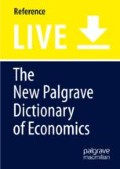Abstract
In a game of incomplete information some of the players possess private information which may be relevant to the strategic interaction. Private information is modelled by a type space, in which every type of each player is associated with a belief about the basic issues of uncertainty (like payoffs) and about the other players’ types. At a Bayesian equilibrium each type chooses a strategy which maximizes its expected payoff given the choice of strategies by the other players’ types. Bayesian equilibrium payoffs are often inefficient relative to the equilibrium payoffs that would result had the players been fully informed.
This chapter was originally published in The New Palgrave Dictionary of Economics, 2nd edition, 2008. Edited by Steven N. Durlauf and Lawrence E. Blume
Bibliography
Aumann, R.J., and A. Heifetz. 2002. Incomplete information. In Handbook of game theory, ed. R.J. Aumann and S. Hart, Vol. 3. Amsterdam: North-Holland.
Battigalli, P., and G. Bonanno. 1999. Recent results on belief, knowledge and the epistemic foundations of game theory. Research in Economics 53: 149–225.
Battigalli, P., and M. Siniscalchi. 2003. Rationalization with incomplete information. Advances in Theoretical Economics 3(1), article 3. Online. Available at http://www. bepress.com/bejte/advances/vol3/iss1/art3. Accessed 25 Apr 2007.
Dekel, E., D. Fudenberg, and S. Morris. 2007. Interim correlated rationalizability. Theoretical Economics 2: 15–40.
Dekel, E., and F. Gul. 1997. Rationality and knowledge in game theory. In Advances in economics and econometrics, ed. D. Kreps and K. Wallis. Cambridge, UK: Cambridge University Press.
Dutta, P.K. 1999. Strategies and games: Theory and practice. Cambridge, MA: MIT Press.
Gale, D. 1996. What have we learned from social learning. European Economic Review 40: 617–628.
Gibbons, R. 1992. Game theory for applied economists. Princeton: Princeton University Press.
Harsanyi, J.C. 1967–8. Games with incomplete information played by Bayesian players, parts I–III. Management Science 14: 159–182, 320–334, 486–502.
Myerson, R. 1991. Game theory: Analysis of conflict. Cambridge, MA: Harvard University Press.
Myerson, R., and M. Satterthwaite. 1983. Efficient mechanisms for bilateral trading. Journal of Economic Theory 29: 265–281.
Osborne, M. 2003. Introduction to game theory. Oxford: Oxford University Press.
Rasmusen, E. 1989. Games and information: An introduction to game theory. Oxford: Basil Blackwell.
Watson, J. 2002. Strategy: An introduction to game theory. New York: W.W. Norton.
Author information
Authors and Affiliations
Editor information
Editors and Affiliations
Copyright information
© 2008 The Author(s)
About this entry
Cite this entry
Heifetz, A. (2008). Epistemic Game Theory: Incomplete Information. In: The New Palgrave Dictionary of Economics. Palgrave Macmillan, London. https://doi.org/10.1057/978-1-349-95121-5_2663-1
Download citation
DOI: https://doi.org/10.1057/978-1-349-95121-5_2663-1
Received:
Accepted:
Published:
Publisher Name: Palgrave Macmillan, London
Online ISBN: 978-1-349-95121-5
eBook Packages: Springer Reference Economics and FinanceReference Module Humanities and Social SciencesReference Module Business, Economics and Social Sciences

